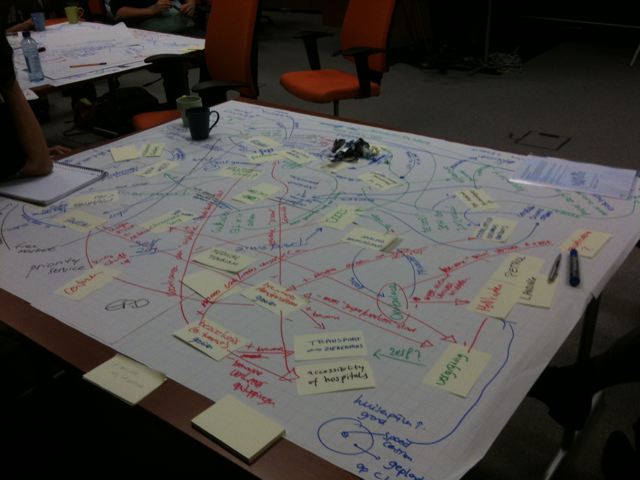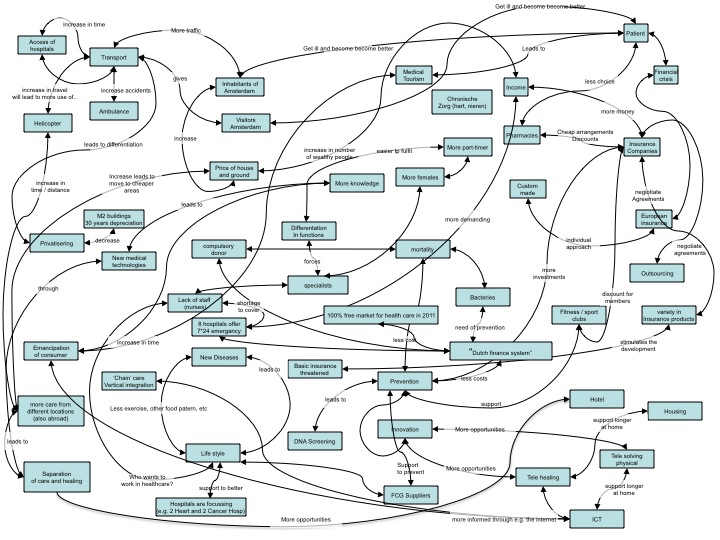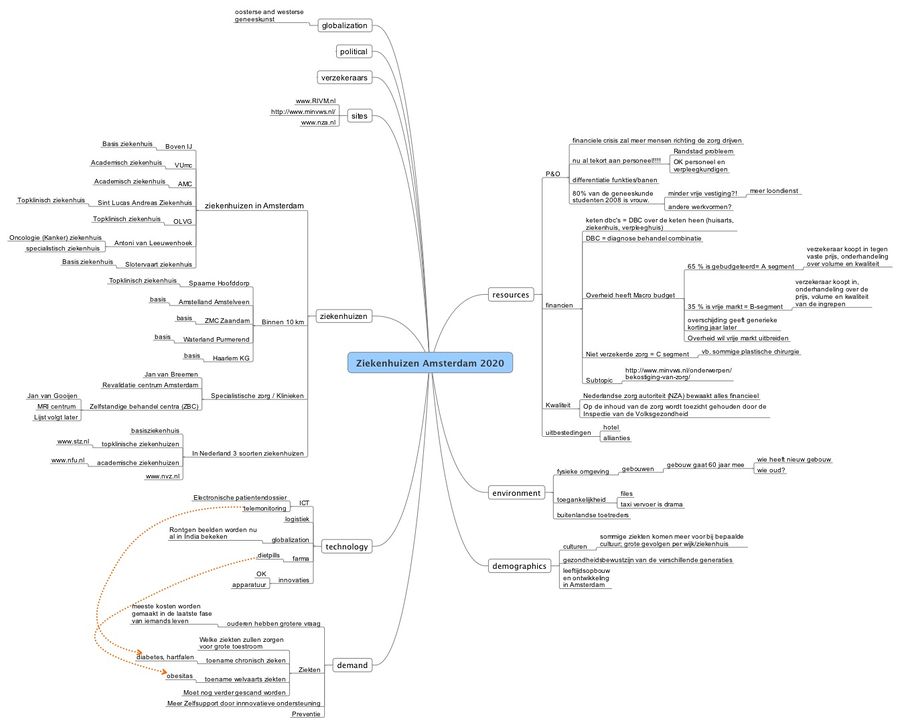Difference between revisions of "The Future of Hospitals in Amsterdam in 2020"
Phoppesteyn (talk | contribs) |
|||
| (44 intermediate revisions by 3 users not shown) | |||
| Line 1: | Line 1: | ||
EMBA09 team: | ==EMBA09 team== | ||
This team was formed by the following members of EMBA09: | |||
*Peter Hoppesteyn<br> | *Peter Hoppesteyn<br> | ||
*Roel Kock<br> | *Roel Kock<br> | ||
| Line 6: | Line 7: | ||
*Marjoleine van der Zwan<br> | *Marjoleine van der Zwan<br> | ||
<br> | <br> | ||
==Introduction== | ==Introduction== | ||
During the first meeting of Scenario Thinking we all presented our 'topics'. Based on the initial topic each of us could vote for his or her favourite. And it turned out that the 'future of hospitals in Amsterdam in 2020' was the most common favourite. With this topic in mind we did a small brainstorm on questions of interest. | |||
*''Will we all have access to hospital care in Amsterdam in 2020, or do we have to travel to Utrecht or Brussels or The Bahamas for specific care? <br> | *''Will we all have access to hospital care in Amsterdam in 2020, or do we have to travel to Utrecht or Brussels or The Bahamas for specific care? <br> | ||
| Line 18: | Line 21: | ||
*''Will The Netherlands be a province of the European Union by 2020? <br> | *''Will The Netherlands be a province of the European Union by 2020? <br> | ||
*''Are the negotiators from the health insurance | *''Are the negotiators from the health insurance companies taken over by European ones or even Azian or American?'' <br> | ||
Who knows. Everything was more or less possible when we started this eight weeks parttime project. <br> | Who knows. Everything was more or less possible when we started this eight weeks parttime project. <br> | ||
| Line 29: | Line 32: | ||
[[2. Unsolidarity?]]<br> | [[2. Unsolidarity?]]<br> | ||
[[3. The health community system]]<br> | [[3. The health community system]]<br> | ||
[[4. All together now]]<br> | [[4. All together now]]<br><br> | ||
==Driving forces== | |||
All teammembers of the group improved two already existing Driving Forces and made and added two new Driving Forces (with a focus on the subject "The Future of Hospitals in Amsterdam in 2020). The most important Driving Forces are shown below: | |||
* [[Innovation in health care]]<br> | |||
* [[Accessibility of hospitals in Amsterdam]]<br> | |||
* [[Biometrics]]<br> | |||
* [[Aging population]]<br> | |||
* [[Low cost of internet connections]]<br> | |||
* [[Continuously growing demand for new medical applications]]<br> | |||
* [[Consumer health informatics in the information age]]<br> | |||
* [[Emergence of new Technology Related Diseases]]<br> | |||
* [[Increasing empowerment of consumers]]<br> | |||
* [[Increasing Neglect of the Elderly]]<br> | |||
* [[Medicine]]<br> | |||
* [[Religion]]<br> | |||
* [[Segmentation]]<br> | |||
* [[Number of people in Amsterdam]]<br> | |||
* [[Number of visitors in Amsterdam]]<br> | |||
* [[Financing and costs of the Dutch health care system]]<br> | |||
* [[The power of insurance companies in health care]]<br> | |||
* [[Decrease Labor productivity in health care]] <br> | |||
* [[Impact of Social and Cultural Differences in Healthcare ]] <br><br> | |||
== | ==Mind Map== | ||
Our first brainstorm session on Driving Forces resulted in the following mind map: | |||
[[Image:Ziekenhuizen 2020.jpeg|900px]] | |||
==Research Questions== | |||
We did research how our first questions made the link with the drivers each of us made individually and the mind map that we build together. <br> | |||
* What is the hospital capacity in Amsterdam and The Netherlands?<br> | |||
* Which differentiations are there at the moment?<br> | |||
* Which stakeholders are known in health care?<br> | |||
* What is the demand?<br> | |||
* What are the trends?<br> | |||
* How is the health care financed?<br> | |||
<br><br> | |||
== | ==Interview Questions== | ||
Each of us made a list of at least 3 questions he or she wanted to ask the interviewee. Together we made even more questions, consolidated the list and choose the best questions. Naturally we also discussed the background of our interviewees, how to start the interview and how to keep the interviewees triggered in his story but also answering our questions.<br> | |||
The questions we made were: | |||
* Which developments were the most impressive to you over the last 15 years?<br> | |||
* Which developments will have the most impact on your hospital over the next 10 years? <br> | |||
* Which developments do you see in Amsterdam? <br> | |||
''a. Which of these developments have a potential impact on hospitals? <br> | |||
''b. Which developments outside The Netherlands have a potential impact on hospitals? <br> | |||
''c. Which developments deserve more attention and/of investigation? Why? <br> | |||
* What are the biggest changes for your hospital in the short time (up till 2 years)? <br> | |||
* What are the biggest opportunities and threats for your hospital between now and 5 years? <br> | |||
''For example: <br> | |||
''a. How will prevention and home health care change demand and how is the hospital going to prepare for these changes? <br> | |||
''b. How is aging affecting the hospital care? When is it the highest impact expected in Amsterdam and in The Netherlands? <br> | |||
''c. Regarding transplantations: what is the need? What is the impact on your hospital? <br> | |||
* A trend in society is “custom made”; how is your hospital adapting to that trend? <br> | |||
* What are the major technological developments and which of them will have the biggest impact on health care in the coming years? <br> | |||
* For which trends is the hospital preparing? <br> | |||
* What do you think hospital care looks like in 2020? <br> | |||
* What needs to be changed in 2020? <br> | |||
* Will there be the same players? <br> | |||
* What shifts do you expect the coming years? <br> | |||
* Will there be a shift in focus? <br> | |||
* Is there enough hospital capacity in 2020? If not, how big is the over- or under capacity? <br> | |||
* Do you expect other demands or changes in health care due to the multiplicity of cultures in Amsterdam in 2020? <br> | |||
* What differences in health care do you expect in Amsterdam compared to the rest of the Netherlands? <br><br> | |||
==Summary of Interviews== | ==Summary of Interviews== | ||
We had three interviews to give us more insight and information.<br> | |||
*[[Interview with the chairman of the board of management]]<br> | *[[Interview with the chairman of the board of management]]<br> | ||
*[[Interview with the financial controller]]<br> | *[[Interview with the financial controller]]<br> | ||
*[[Interview with the responsible manager for housing and buildings]]<br> | *[[Interview with the responsible manager for housing and buildings]]<br><br> | ||
==System Diagrams== | ==System Diagrams== | ||
The photo (below) shows the Driving Forces and their impact on each other. <br><br> | |||
Systems Diagram: first version <br> | Systems Diagram: first version <br> | ||
[[Image:mindpic.jpg]] | [[Image:mindpic.jpg]] | ||
<br><br><br> | <br><br><br> | ||
The imput (shown on the picture) has been put in Powerpoint. And in various versions, updated by every teammember, to this presentation.<br><br> | |||
Systems Diagram: final version<br> | Systems Diagram: final version<br> | ||
[[Image:mindmap.jpg]] | [[Image:mindmap.jpg]] | ||
| Line 120: | Line 119: | ||
==Scenarios== | ==Scenarios== | ||
Finally we choose and realized four scenarios.We build the story of the scenarios individually and together. In the scenarios we made links to the the drivers that inspired us to build the story of the scenarios. Most of the scenarios have the same drivers.<br> | |||
[[1. Transsensual]]<br> | [[1. Transsensual]]<br> | ||
[[2. Unsolidarity?]]<br> | [[2. Unsolidarity?]]<br> | ||
| Line 137: | Line 137: | ||
*[http://www.cbs.nl Statistics Netherlands]<br> | *[http://www.cbs.nl Statistics Netherlands]<br> | ||
*[http://www.nictiz.nl NICTIZ]<br> | *[http://www.nictiz.nl NICTIZ]<br> | ||
*[http://sync.nl/vinger-aan-de-pols-met-sensoren/1 SYNC on elderly people]<br> | |||
*[http://sync.nl/ook-de-insulinepomp-krijgt-ipod-looks/ SYNC on modern healthcare tools] <br> | |||
*[http://www.gvsmedia.com/video-2/rpJQNMBNtOo/-Way-of-the-Future---Nokia-Nanotech--Morph--Concept-Phone-- Nokia Nanotech]<br> | |||
*[http://video.google.com/videosearch?q=nanotechnology+development+carbon&hl=en&emb=0#q=nanotechnology+example&hl=en&emb=0&start=60 Nanotechnology]<br> | |||
*[http://sync.nl/hoe-een-robot-kan-helpen-bij-hartoperaties/ SYNC on healthcare robots] | |||
Latest revision as of 21:54, 22 October 2009
EMBA09 team
This team was formed by the following members of EMBA09:
- Peter Hoppesteyn
- Roel Kock
- Piotr Ptasinski
- Miranda Tjiang
- Marjoleine van der Zwan
Introduction
During the first meeting of Scenario Thinking we all presented our 'topics'. Based on the initial topic each of us could vote for his or her favourite. And it turned out that the 'future of hospitals in Amsterdam in 2020' was the most common favourite. With this topic in mind we did a small brainstorm on questions of interest.
- Will we all have access to hospital care in Amsterdam in 2020, or do we have to travel to Utrecht or Brussels or The Bahamas for specific care?
- Will we live longer and have higher demands for quality?
- Will technology and ICT continue to devolope at high speed?
- How can health care be finances in 2020?
- Will The Netherlands be a province of the European Union by 2020?
- Are the negotiators from the health insurance companies taken over by European ones or even Azian or American?
Who knows. Everything was more or less possible when we started this eight weeks parttime project.
In order to investigate the different possibilities we researched literature, had interviews with three executives (CEO, Planning & Control, Construction) and were coached by our professor Erasmus.
These sources of information form the basis under the four scenarios of the future of hospitals in Amsterdam in 2020:
1. Transsensual
2. Unsolidarity?
3. The health community system
4. All together now
Driving forces
All teammembers of the group improved two already existing Driving Forces and made and added two new Driving Forces (with a focus on the subject "The Future of Hospitals in Amsterdam in 2020). The most important Driving Forces are shown below:
- Innovation in health care
- Accessibility of hospitals in Amsterdam
- Biometrics
- Aging population
- Low cost of internet connections
- Continuously growing demand for new medical applications
- Consumer health informatics in the information age
- Emergence of new Technology Related Diseases
- Increasing empowerment of consumers
- Increasing Neglect of the Elderly
- Medicine
- Religion
- Segmentation
- Number of people in Amsterdam
- Number of visitors in Amsterdam
- Financing and costs of the Dutch health care system
- The power of insurance companies in health care
- Decrease Labor productivity in health care
- Impact of Social and Cultural Differences in Healthcare
Mind Map
Our first brainstorm session on Driving Forces resulted in the following mind map:
Research Questions
We did research how our first questions made the link with the drivers each of us made individually and the mind map that we build together.
- What is the hospital capacity in Amsterdam and The Netherlands?
- Which differentiations are there at the moment?
- Which stakeholders are known in health care?
- What is the demand?
- What are the trends?
- How is the health care financed?
Interview Questions
Each of us made a list of at least 3 questions he or she wanted to ask the interviewee. Together we made even more questions, consolidated the list and choose the best questions. Naturally we also discussed the background of our interviewees, how to start the interview and how to keep the interviewees triggered in his story but also answering our questions.
The questions we made were:
- Which developments were the most impressive to you over the last 15 years?
- Which developments will have the most impact on your hospital over the next 10 years?
- Which developments do you see in Amsterdam?
a. Which of these developments have a potential impact on hospitals?
b. Which developments outside The Netherlands have a potential impact on hospitals?
c. Which developments deserve more attention and/of investigation? Why?
- What are the biggest changes for your hospital in the short time (up till 2 years)?
- What are the biggest opportunities and threats for your hospital between now and 5 years?
For example:
a. How will prevention and home health care change demand and how is the hospital going to prepare for these changes?
b. How is aging affecting the hospital care? When is it the highest impact expected in Amsterdam and in The Netherlands?
c. Regarding transplantations: what is the need? What is the impact on your hospital?
- A trend in society is “custom made”; how is your hospital adapting to that trend?
- What are the major technological developments and which of them will have the biggest impact on health care in the coming years?
- For which trends is the hospital preparing?
- What do you think hospital care looks like in 2020?
- What needs to be changed in 2020?
- Will there be the same players?
- What shifts do you expect the coming years?
- Will there be a shift in focus?
- Is there enough hospital capacity in 2020? If not, how big is the over- or under capacity?
- Do you expect other demands or changes in health care due to the multiplicity of cultures in Amsterdam in 2020?
- What differences in health care do you expect in Amsterdam compared to the rest of the Netherlands?
Summary of Interviews
We had three interviews to give us more insight and information.
- Interview with the chairman of the board of management
- Interview with the financial controller
- Interview with the responsible manager for housing and buildings
System Diagrams
The photo (below) shows the Driving Forces and their impact on each other.
Systems Diagram: first version

The imput (shown on the picture) has been put in Powerpoint. And in various versions, updated by every teammember, to this presentation.
Systems Diagram: final version

Scenarios
Finally we choose and realized four scenarios.We build the story of the scenarios individually and together. In the scenarios we made links to the the drivers that inspired us to build the story of the scenarios. Most of the scenarios have the same drivers.
1. Transsensual
2. Unsolidarity?
3. The health community system
4. All together now
Resources
- Ministry of Health Welfare and Sports
- Dutch Healthcare Authority
- Sint Lucas Andreus Hospital
- Academic Medical Centre
- Wikipedia
- Obesitas
- National Institute for Public Health and the Environment
- Netherlands Bureau for Economic Policy Analysis
- Amsterdam
- Statistics Netherlands
- NICTIZ
- SYNC on elderly people
- SYNC on modern healthcare tools
- Nokia Nanotech
- Nanotechnology
- SYNC on healthcare robots
